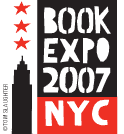- Categories:
BEA Gathers Industry Input Via Show & Tell
 On Wednesday, August 23, the BookExpo America management team met with representatives from various segments of the book industry at Reed Exhibitions headquarters in Norwalk, Connecticut, to discuss ways to enhance the annual trade show.
On Wednesday, August 23, the BookExpo America management team met with representatives from various segments of the book industry at Reed Exhibitions headquarters in Norwalk, Connecticut, to discuss ways to enhance the annual trade show.
Lance Fensterman, event director for BEA, told BTW via email that the "BEA Show & Tell" was an effort to help his team understand the book business in a deeper way.
Along with Fensterman and the "entire core BEA team," participants included Carl Lennertz, vice president of independent retailing at HarperCollins; Carol Fitzgerald, owner of The Book Reporter; Craig Popelars, director of marketing for Algonquin Books; Karen Corvello, store manager and frontlist buyer for R.J. Julia Booksellers in Madison, Connecticut; Len Vlahos, ABA's director of education; and two Reed vice presidents who were there to observe the proceedings.
Fensterman explained that the "ultimate goal is for BookExpo America to create a strong relationship with all of our customers (publishers, booksellers, authors, rights professionals, etc.), and to achieve that goal it takes one-on-one relationship building and understanding. My goal was to create a greater understanding on the part of my team with the industry."
The meeting featured an in-depth discussion about the value the show delivers to publishers, booksellers, and the media. "That value comes in a countless number of ways," Fensterman said. "And yet they are all interconnected." Other topics included the types of authors selected for special events at BEA (big names versus emerging), the role of editors at the show and how they can be highlighted better, and the issue of self-published authors at the show.
ABA's Vlahos told BTW, "It was fascinating to hear the different perspectives on BEA, and to understand how the show means different things to different constituencies. The cooperative spirit of the brainstorming session made it clear that BEA plays a vibrant and central role in what we all do."
Lennertz noted, via e-mail, that, from a publisher's perspective, he wanted to highlight "our enormous desire to bring as many booksellers and authors together as possible -- at signings, lunches, dinners and in the booth. That is essential to us in launching books and building careers." In addition, he discussed the need to have meetings with as many customers as possible to talk about business, trends, events, marketing, shared goals, and more.
"We highly value both the BEA and ABA education tracks on Thursday, the result of which is to help booksellers get even better at what they do best," Lennertz said. "And, of course, we focus on key fall books, though it's not the 'selling' show it used to be, which is fine."
The Book Reporter's Fitzgerald told BTW, via e-mail, "Last week's meeting was one of the more interesting afternoons that I have spent in my decade in this business. I usually see the show just through my own lens -- how I use the show for my own business. I appreciated hearing how the others use it and how it has changed over the past years. Carl Lennertz did a comparison of what the show meant a decade or so ago and what it means now, which included how so much of the show now is about connecting booksellers and librarians with authors -- opening a conversation between them."
Expressing thanks to Fensterman and the BEA team for asking for feedback, Fitzgerald continued, "We opened a terrific dialogue, and [BEA staff] seemed open to the ideas that we were suggesting.... I truly feel some will be implemented. We were not hearing 'this is the way we do it,' but instead 'tell us what you think could make the show stronger.'"
BEA will be conducting similar meetings in the future, Fensterman said, and noted, "The experience was extremely valuable for all involved. I would like to continue highlighting different aspects of the industry, including librarians, rights agents, international attendees, etc." --David Grogan

